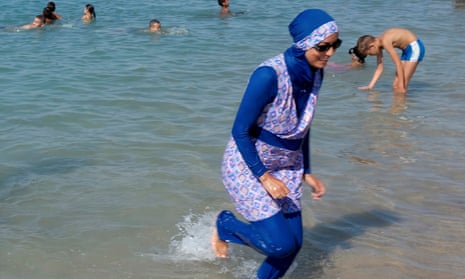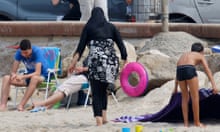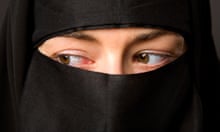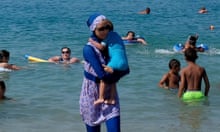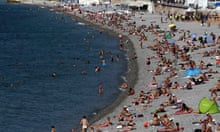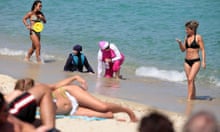A majority of mayors who have banned burkinis in about 30 French coastal resorts are refusing to lift the restrictions despite the country’s highest administrative court ruling that the bans are illegal, leaving the state facing a dilemma about how to react.
More than 20 mayors have defiantly kept in place decrees under which municipal police can stop and fine any women in full-body swimsuits at the beach despite the ruling from the state council that the burkini bans are a “serious and manifestly illegal violation of fundamental freedoms”.
In a test case expected to set legal precedent, the court suspended the burkini ban in one French Riviera town, Villeneuve-Loubet, which was obliged to immediately scrap its decree. But the ruling was dismissed by many other mayors.
The interior minister, Bernard Cazeneuve, who has called for calm and warned against stigmatising Muslims in France, is expected to make an announcement on the issue on Monday. The Green housing minister, Emmanuelle Cosse, said mayors who refused to take the court ruling into account were playing with fire.
Most of the bans are still in place along the French Riviera, including in Nice and a swath of resorts along the Côte d’Azur. The mayor of Cannes, David Lisnard, from Nicolas Sarkozy’s Les Républicains party, was the first mayor to ban burkinis this summer and said he would not budge. He said the ruling “does not in any way change my conviction that ostentatious dress, whatever the religion, is a problem in the current context”. He said burkinis were “Islamist” and a sign of the “salafisation of our society”.
Only two mayors lifted their bans in the wake of the Villeneuve-Loubet ruling: the Socialist mayor of Oye-Plages near Calais and the centrist mayor of Eze in the Alpes-Maritimes. Mayors from the rightwing Les Républicains party and from the far-right Front National are keeping their bans in place, insisting that the Villeneuve-Loubet case does not apply to them.
The burkini bans – which are now seen as illegal – pose a major problem to the French state, which is responsible for making sure the rule of law is respected. In theory, the state could now instruct local prefects to take action to force mayors to withdraw the bans. Human rights groups have also said they will pursue the towns through courts.
The Socialist prime minister, Manuel Valls, who had caused divisions in his party by supporting the mayors’ bans, insisted that the political debate on burkinis must continue. In a written statement on Facebook, he said the burkini was “the affirmation of political Islam in the public space”.
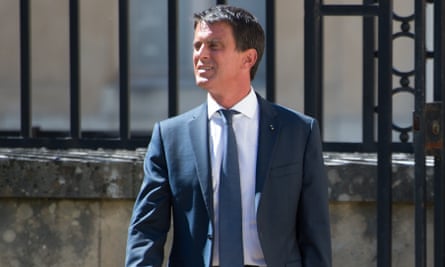
The issue of the burkini and Islam in France has been pushed to the top of the political agenda in the run-up to next year’s presidential and parliamentary elections by Sarkozy, who is running a hardline campaign on French national identity in a bid to win his party’s nomination to run again for president. Sarkozy reiterated that he wants a nationwide law to ban burkinis and also wants to ban Muslim headscarves from universities and private companies.
Alain Juppé, the mayor of Bordeaux, who remains favourite to be chosen as the right’s candidate, launched his campaign against Sarkozy this weekend, striking a conciliatory tone. He is against a nationwide law against burkinis, saying it would be illegal and anti-constitutional, and that it was pointless to push for a new law “amid media agitation”. He told Europe 1 radio that politicians should stop using inflammatory rhetoric to “throw oil on the fire”.
Holding a rally west of Paris on Saturday, Juppé nonetheless proposed creating a special accord between the state and Muslim leaders to lay out clear rules for respecting French secularism.
“It is legitimate to ask them to have a knowledge of the principles of the organisation of the republican state, especially French-style secularism,” he said.
The short-term burkini bans, which began to be issued by mayors at the end of July, have sparked a heated political row about the French principle of laïcité – secularism built on the strict separation of church and state – amid accusations by rights groups that politicians are twisting and distorting the principle for political gain, and using it to deliberately target Muslims following a series of terrorist attacks.
Following reports of some women being stopped by police for simply wearing a headscarf and loose clothing while standing on the beach, controversy has grown.
Benoît Hamon, a former Socialist government minister seeking the left’s presidential nomination, said on Sunday that the burkini debate was “targeting Muslims once again” and criticised Valls for supporting bans.
